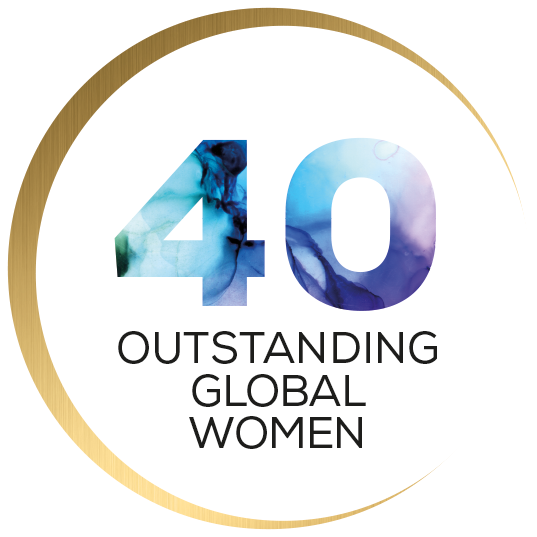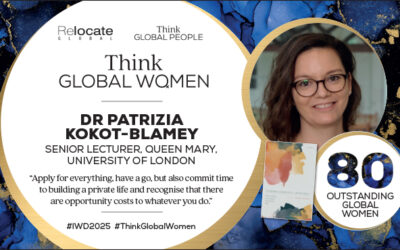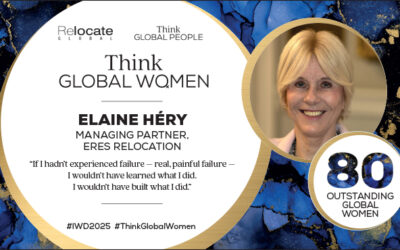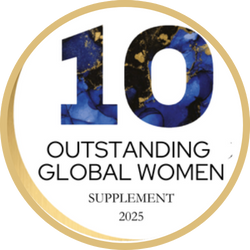Think Women
Claudine Hakim | 40 Outstanding Global Women 2023
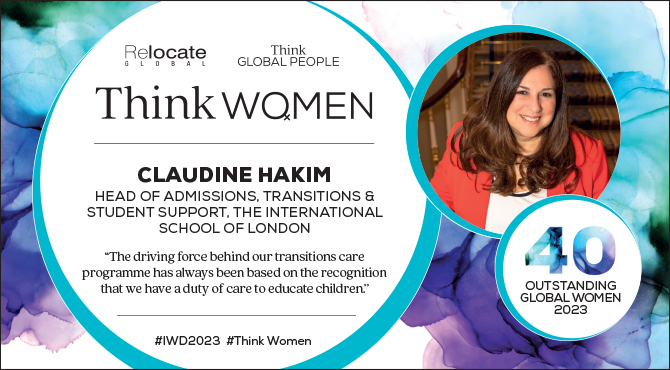
Suporting healthy transitions for everyone
Claudine Hakim is the head of advancement, transitions and student support at the International School of London. A pioneering educator, pedagogical leader and current chair of Safe Passage Across Networks (SPAN), Claudine is actively enhancing the wellbeing of students, internationally mobile families and school communities around the world.
A long-held appreciation of diversity and inclusion is the bedrock of Claudine Hakim’s trailblazing career in international education. Through her innovative work at the multi-award-winning and truly International School of London (ISL), and now as governing chair of education charity and training organisation, Safe Passage Across Networks (SPAN), Claudine’s personal leadership is helping to break new ground around the support schools can provide for relocating families.
“Environments that put wellbeing at the core are healthier communities. It doesn’t mean life’s all perfect. But it does mean there is a framework for everyone – families, schools, educators – to work together to address challenges collectively and empathetically.”
Claudine Hakim, the Head of Advancement, Transitions and Student Support at ISL
Currently half of international schools have an active transitions programme; and just 6% say that it is fit for purpose. Yet under Claudine’s leadership in positive transitions care, ISL and SPAN are lighting the way for other schools.
ISL has developed a global reputation for innovation and excellence through its IB, home languages, positive transitions-care programme and inclusive school community that promote individual and collective wellbeing. It offers lessons in 25 home languages to support students’ attachments to their home culture or cultures and identity, as well as English lessons and communities for family members, so everyone can make their personal transitions in the best possible way.
Thanks to Claudine’s tireless work and authentic leadership, internationally mobile families, forward-thinking international schools and employers are therefore much better placed to support the wellbeing of every family member during times of transition, improving the chances of assignment and educational success.
“The driving force behind our positive transitions-care programme has always been based on the recognition that we have a duty of care to educate children. We therefore need to look at every aspect of what impacts their learning to do this effectively,” says Claudine.
“Wellbeing is something we understood even prior to Covid as being important. I see it as our responsibility as educators to make sure that we collaborate to support the family, our students and staff before, during and after transitions. I strongly believe every school should have a positive transitions care programme in place.”
Appreciating individual journeys
Claudine’s thinking and practice is informed by her own journey and life-defining moves. Born and raised in Ghana she then moved to Lebanon, her country of origin, in her teens. Claudine then relocated away from the country’s upheavals in the 1980s to settle in London.
Claudine’s transient and culturally diverse experience mirrors that of many children and families she helps settle today at ISL. With a background in psychology and 20 years’ experience of working with children who are neurodiverse, Claudine has developed a unique, empathetic and valuable perspective on what is needed to make a good move. “The welcome and compassion shown to me from the British community when I came to London to study as a young woman gave me an understanding of the importance of good transitions and an appreciation of valuing diversity and inclusion within this,” says Claudine.
This experience of moving to the UK to study in the 1980s was a catalyst for Claudine’s lifelong journey as a leader in education and positive transitions-care. Claudine completed a bachelor’s degree in psychology before completing a master’s degree in educational leadership at UCL’s Institute of Education. Her studies included a placement at a school in Battersea, London, for children with additional educational needs, where she returned after graduating.
Claudine’s warmth, passion and natural flair as an educator saw her become the school’s youngest-ever headteacher and gain further valuable leadership experience. This Claudine progressed in her next roles; first as the headteacher of an international school, then the founding headteacher at ISL Surrey. This role was a watershed moment for Claudine and her work in positive transitions-care.
It was while at ISL Surrey through the Families in Global Transition network that Claudine met and began to learn about the work of psychologist and author, Drs Doug Ota. His ground breaking studies based on established neuroscience build on Professor John Hattie’s work, which includes the world’s largest ever study of students. Both focus on the importance of positive transitions for all students, particularly those who are internationally mobile, for educational attainment and all-round lifelong wellbeing.
Valuing wellbeing in p positive transitions care
This intersection of research and practice defines Claudine’s approach. Under her leadership as head of advancement, transitions and student support, ISL’s positive transitions-care programme has been established for over ten years as is part of its DNA. Through Claudine, ISL is now working with the wider international school community to promote and share learnings around healthy transitions. “I attended a workshop that Doug provided, and the rest is history,” says Claudine.
As Covid proved, staying connected and having a feeling of belonging and attachment to a supportive community is critical during times of change and helps build resilience. SPAN’s own NEST network was also set up during this time, connecting people all over the world.
“Environments that put wellbeing at the core are healthier communities,” says Claudine. “It doesn’t mean life’s all perfect. But it does mean there is a framework for everyone – families, schools, educators – to work together to address challenges collectively and empathetically. It’s a way of responding positively and proactively to real life.”
For Claudine – as well as encouraging and supporting other schools to embed excellence in transitions-care – the focus at ISL now is on continuing to learn and sustaining healthy communities and positive attachments.
“A transitions-care programme – even in the international schools’ sector – is by nature transient,” says Claudine. “Students and staff will come and go. Even as you set up a programme designed to ensure a family’s and the entire community’s experience is a positive one, you still have to work carefully at passing the baton to new members of staff and new families. Likewise, always building relationships with other schools to ensure that smooth passage of staff, students and families. It takes a truly dedicated team to run a successful programme.”
The importance of intentionality
Encouraging other schools to develop their own programmes and collaborate with each other is a key part of Claudine’s leadership today, both at ISL and SPAN. “The ‘network’ bit of SPAN (Safe Passage Across Networks) is about working with other schools,” says Claudine. “We need to have that collaborative approach. Sharing good practice is about creating consistency and a safe space, and through SPAN, a ‘passport’ for children, families and other schools as they move.
“It’s about making positive transitions-care intentional. The more we learn, the more we realise there’s more to learn. Now at ISL we are looking at the stayers, whether it’s a staff member, student or family. We used to put a lot of emphasis on new people. But we also have staff members who have been here for 20 years or so. It’s about how we validate their experiences. Without them, the institution’s history and culture wouldn’t be there. It’s exciting because it’s new to learn and something more we can do for our community.
“This is what I am working towards, this sustainability. You will always have certain champions, and people who hold the torch, but if you really want something to be embedded and part of the ritual, you need to be intentional about how you do that.”
There are clear crossovers here with retention in the labour market, and the constant change and transformation of companies and organisations, including more widely across education as a whole. “I think maybe my biggest lesson is that this isn’t just for international schools,” says Claudine. “This has been my biggest ‘ah-ha’ moment over the years. I realised that even if a child is staying in one school or country and moving into different education stages, the transition is the same. The international aspect may add more layers, but regardless, that emotion is still there.”
With this insight, and armed with new research around healthy transitions-care, education attainment and wellbeing, Claudine is continuing to improve the experience for all students, families and the communities she is part of. “That’s my mission now. It goes beyond ISL. This is where my work with SPAN is; to spread the word to all schools and every school can benefit from this kind of programme.”

